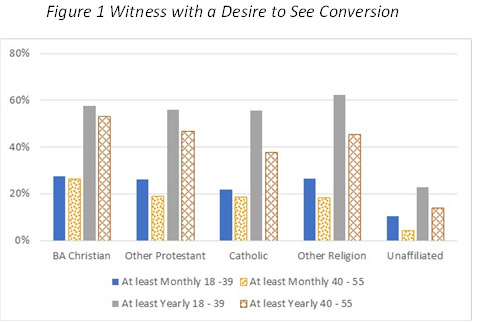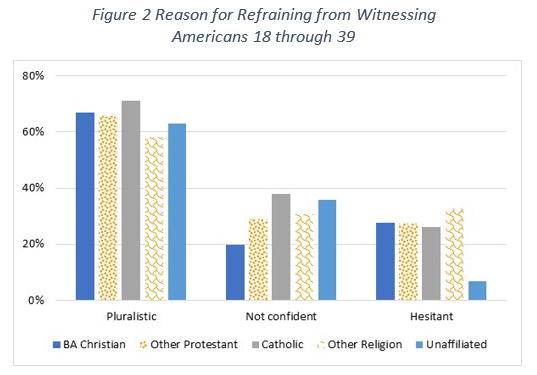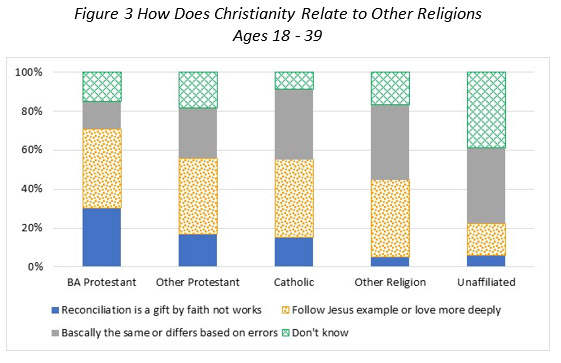Are our adults ready to give a defense of the gospel? When challenged, can they give a reasonable explanation of their faith? Dr. Bohlin presents a sobering view of this question based upon years of experience questioning high school and college-age students on the basis for their belief in Christ. By exposing their lack of cogent answers to questions they may be asked, he challenges them to spend time exploring the questions and developing biblical worldview-based answers.
The Professor
Over the last ten years, I have used a very effective technique to help teens realize their unpreparedness for the step toward college. It seems our young people are heading into public and even Christian colleges thinking they are ready for the challenge to their faith that higher learning can be.
Probe Ministries has sponsored a college prep conference since 1991 that was designed to help young people gain some insights and even some knowledge on how to address the intellectual challenges that college will provide.
If you remember the thousands of college radicals who protested and picketed in the ‘60s and ‘70s, they found their push for change was not very effective. Instead, many of them stayed in college, obtained Masters Degrees and PhDs. After all, it was easier than getting a real job! As a result, they are now your children’s professors!
The college campus was an anti-Christian breeding ground several decades ago and now it is even worse. Christianity is not so much openly mocked as it is marginalized and deemed a false and mischievous mythology.
If you haven’t already heard some of these statistics, you need to hold onto your hat.
In 2007, LifeWay surveyed 23- to 30-year-olds and found that seventy percent had taken at least a one year break from church during their college years.{1} Now, almost two-thirds of these return to some level of church attendance, but mainly to please family or friends who encouraged them to return. That means that most of our churched youth are making many of their life decisions, including marriage and career, apart from a church context. Even many who return carry numerous scars from bad choices during those years.{2}
With this statistical background, it’s plain our young people need some preparation before going on to college or the military. But as most parents of teens know, just telling them they need this is less than likely to be convincing.
Enter the Professor. The technique I mentioned at the beginning is to impersonate an atheistic college professor doing research on the religious beliefs of young people. Sometimes the students know I am playing a role with them, but occasionally I play the professor and the students are none the wiser.
A Simple Question
When I step to the front of the room, I introduce myself as Professor Hymie Schwartz (a name borrowed from my late colleague Jerry Solomon who played this role far better than I do). I tell the group that, since I am conducting research on the religious beliefs of young people, their youth pastor, counselor, principal, teacher—whatever, has allowed me to visit with them.
I begin the conversation something like this: “Since this is a church or Christian school I presume you are all Christians. Is anyone not a Christian?” Of course no one raises their hand. But I am always aware that some may indeed not be believers and may not appreciate my questioning so I am always paying attention.
At this point I simply call on someone, usually someone who isn’t really paying attention or is engrossed in conversation with a neighbor. “You! Are you a Christian?” No one has ever answered no. Upon receiving an affirmative answer, with hands casually stuck in my pockets, I demand, “Why?”
Students are paying attention now. This is for real. Now consider my question for yourself. If Peter warns us to always be ready to give an answer to anyone who asks to give a defense for the hope that we have, this is a pretty basic question. In our highly secular culture, if someone finds out you’re a Christian, they may indeed ask you why. Peter says you ought to have an answer.
But this simple question why is usually something our young people, and even their parents, have never really considered. Their Christian faith is certainly something they would claim is central to their lives, but the dumbfounded looks on their faces tells me repeatedly that this question is a new one.
It’s usually about this time that any parents sitting in the back are suddenly quite relieved I’m not talking to them!
By asking such questions, I can get them pretty riled up and confused. The point is not to have fun but to help them see that they need to be prepared and think a little about why Christianity is important to them and why they think it’s true.
“I Asked Jesus into My Heart!”
Having their Christianity questioned usually comes as a surprise and even shock. Rather than directly answering the question, they try to tell me how they became a Christian. It usually takes the form of confidently saying they asked Jesus into their heart.
The professor quickly fires back, “You asked Jesus into your heart?! That sounds pretty gross, really. What’s he doing in there with all that blood? Yuck!” That always gets a surprised reaction and a little befuddlement. The student typically tries to recover by saying something like, “No, I mean it’s like I trusted Jesus as my Savior.”
Again the professor will fire back quickly with a question like, “Why did you do that?” or “Savior? What did you need saving from?” I think you can see where this is going. It really is not difficult to pick something from what he or she said and challenge it. I either pretend I don’t understand what they said, forcing them to better explain themselves (which is rare), or I deliberately ask them why they think that way, or how they know that.
In answer to “How do you know that?” I am often told that “It says so in the Bible!” They usually can’t tell me where the Bible says that. I also ask if the Bible is true, and they say it is. But when I ask, “How do you know it’s true?” the blank stare reemerges.
Sometimes a student will say, “Because it’s the word of God!” Now I can really dig a little deeper. In response to further questioning, they usually can’t tell me where the Bible says it’s the Word of God nor can they tell me why the Bible is different from The Book of Mormon or the Qur’an. If there is a youth pastor or chaplain present there is usually an embarrassed look on their face or a head buried in their hands.
By this time the class is very tense and full of nervous laughter. When I reach a dead end with a student—for instance when they say, “I don’t know” with a very resigned and defeated voice—I look for one of the laughing students and ask, “What about you?” Of course that gets everybody’s attention again and off we go.
While I admit I have a little fun playing this role, it never ceases to break my heart at how ill-prepared our young people are to follow Peter’s advice to always be prepared with an answer. I have yet to find a student in ten years who is willing and able to go toe-to-toe with the professor.
“You’re a Narrow-Minded, Self-Righteous Bigot!”
Here are three other directions our conversations have frequently taken.
When I have challenged students to tell me why they think or believe Christianity is true, some will turn to their own subjective experience. Technically, there is nothing wrong with this, specifically when speaking to a Christian audience. But someone who doesn’t even believe in God will frequently find ways to truly make fun of this element.
A student may describe that Jesus speaks to them in their prayer time, to which I quickly ask what His voice sounds like or how they know it was Jesus and not indigestion. The blank stares usually resume at this point. We have become so comfortable in our Christian bubble sometimes that we frequently don’t see how unintelligible our language is to those outside the community of faith. It’s tough to share the gospel that way.
Sometimes a student will interject that they believe in Jesus because that’s what their family has taught them or it’s what they learned in church. I usually pounce on that pretty quickly and repeat that this student believes Christianity is true because their parents told them so. The student usually agrees. After commending them for honoring their parents I tell them that’s really pretty stupid. Pausing a second for the shock to register, I go on about the boy raised in India whose parents are Hindu and he respects his parents and believes Hinduism is true, so the boy in India and this student are both headed to heaven because they trusted their parents!
One time a student stammered around and eventually agreed with my statement as his youth pastor put his head in his hands.
Finally in talking about salvation I ask what happens to those who don’t believe in Jesus. Most will hesitatingly say they go to hell. The professor predictably rants, “Just because I don’t believe the same fairy tale as you, I’m going to hell?” When they predictably shake their head yes, I get down eye to eye and spit out, “You’re a narrow minded, self-righteous bigot!”
Always Be Ready to Give an Answer, with Gentleness and Respect
Students enjoy the interactive nature of this routine even though they are routinely embarrassed by their inability to handle the challenge. When Peter admonished all of us to always be ready to give an answer to everyone who asks us for a reason for the hope that we have, yet with gentleness and respect (1 Pet. 3:15), they fail miserably. Perhaps as a parent, you may be glad that I don’t do this with adult groups.
Often students will try to turn the conversation in their favor by asking the professor a question. I quickly dismiss that idea by simply answering that I’m asking the questions. But when we’re done, if time allows I attempt to leave them with hope by quickly summarizing how I, Dr. Ray Bohlin, Vice-President of Probe Ministries, would answer the same question.
Here’s the outline of my response. In a calm voice I quickly assert that I know there is a God. As a scientist I look principally at how marvelously our universe, galaxy, solar system, and planet are designed for complex life here on earth. The number of highly improbable coincidences rules out chance and strongly implies design. This is reinforced by the evidence from biology of the incredible complexity of life, particularly the coded information in DNA. This remarkable molecule with its accompanying system of transcription and translation screams for intelligence.
The fact that all people have some sense of right and wrong, even though we may disagree sometimes, tells us we are comparing our morality to some invisible standard outside ourselves that must come from a supreme Law Giver. I am convinced there is a supernatural God.
If this God exists, then has He spoken to man? I quickly tell about the uniqueness of Scripture, written by forty authors from eight countries over fifteen hundred years in three languages and all with a consistent and unique message of a God of love who ransomed us from our sins. Where we have archaeological evidence it consistently confirms the accuracy of biblical events. I am convinced the Bible is the true and unique Word of God.
The Bible throughout is about Jesus, who repeatedly claimed to be the unique divine Son of God and offered his death and resurrection on behalf of mankind as proof. That Jesus bodily rose from the dead is the only rational conclusion of the evidence of the empty tomb. On top of that, my personal experience of the last thirty-seven years has shown me again and again the unique love and power of God.
So what about you? Why are you a Christian?
Notes
1. “LifeWay Research Uncovers Reasons 18 to 22 Year Olds Drop Out of Church,” 2007, www.lifeway.com/article/165949/, accessed May 15, 2010.
2. Youth Transition Network has researched this problem over the last ten years and has excellent resources, videos, research, and books and DVDs for purchase. Take a look at www.ytn.org.
© 2010 Probe Ministries

 What made the Romans such a formidable force? Discipline and adaptability. Being able to march long distances and maneuver across a variety of terrain. Timing and distance determine the victor of any confrontation. To do this, they needed shoes that were durable and able to grip the ground firmly.
What made the Romans such a formidable force? Discipline and adaptability. Being able to march long distances and maneuver across a variety of terrain. Timing and distance determine the victor of any confrontation. To do this, they needed shoes that were durable and able to grip the ground firmly. We are also told to take up the Shield of Faith (Ephesians 6:16) to extinguish the flaming arrows of the evil one. The favored shield in the time Ephesians was written was the Roman scutum, a large shield that protected most of the soldier’s body, enabling the Romans to protect both themselves and each other in tight formations without sacrificing their defense when fighting in looser formations. Most deaths in ancient battles occurred after, during, and after a rout. Therefore projectiles were used to disrupt and to instill fear before the two sides met in melee. Standing firm against hails of projectiles was key to surviving the battle.
We are also told to take up the Shield of Faith (Ephesians 6:16) to extinguish the flaming arrows of the evil one. The favored shield in the time Ephesians was written was the Roman scutum, a large shield that protected most of the soldier’s body, enabling the Romans to protect both themselves and each other in tight formations without sacrificing their defense when fighting in looser formations. Most deaths in ancient battles occurred after, during, and after a rout. Therefore projectiles were used to disrupt and to instill fear before the two sides met in melee. Standing firm against hails of projectiles was key to surviving the battle. Finally, Ephesians 6:17 refers to the Sword of the Spirit, or the word of God. In conjunction with the scutum was the gladius, a short sword primarily used for thrusting and short cuts. It was the legionary’s primary weapon. After throwing their pila (specialized javelins) to disrupt the enemy formation, the Romans drew their swords and closed the distance to engage in hand-to-hand fighting. Their armor and discipline enabled them to weather the brutal melee far better than their opponents. Ideally, this caused the enemy to rout.
Finally, Ephesians 6:17 refers to the Sword of the Spirit, or the word of God. In conjunction with the scutum was the gladius, a short sword primarily used for thrusting and short cuts. It was the legionary’s primary weapon. After throwing their pila (specialized javelins) to disrupt the enemy formation, the Romans drew their swords and closed the distance to engage in hand-to-hand fighting. Their armor and discipline enabled them to weather the brutal melee far better than their opponents. Ideally, this caused the enemy to rout.
 Looking at the detailed results, all religions except the Unaffiliated showed very similar results: over 20% (1 in 5) of those witnessed at least monthly and about half witnessed at least yearly. So, it would appear that there is a lot of witnessing going on with very few conversions.
Looking at the detailed results, all religions except the Unaffiliated showed very similar results: over 20% (1 in 5) of those witnessed at least monthly and about half witnessed at least yearly. So, it would appear that there is a lot of witnessing going on with very few conversions. We also asked the question: “When I refrain from communicating my religious belief with someone, it’s usually because:”
We also asked the question: “When I refrain from communicating my religious belief with someone, it’s usually because:” The results are charted in the graph to the right. First, notice the interesting result that only about 30% of Born Again Protestants selected ‘reconciliation is a gift’ while 40% selected following Jesus’ example or love others more deeply. As noted above, this second answer is not inconsistent with the concepts of Christianity but is not as fundamental as the first. However, selecting this answer over reconciliation is a gift’ is consistent with what we saw earlier: 70% of Born Again Christians are not exclusivists.
The results are charted in the graph to the right. First, notice the interesting result that only about 30% of Born Again Protestants selected ‘reconciliation is a gift’ while 40% selected following Jesus’ example or love others more deeply. As noted above, this second answer is not inconsistent with the concepts of Christianity but is not as fundamental as the first. However, selecting this answer over reconciliation is a gift’ is consistent with what we saw earlier: 70% of Born Again Christians are not exclusivists. Dr. Ray Bohlin
Dr. Ray Bohlin Dr. Lawrence Terlizzese
Dr. Lawrence Terlizzese Rick Wade
Rick Wade Paul Rutherford
Paul Rutherford